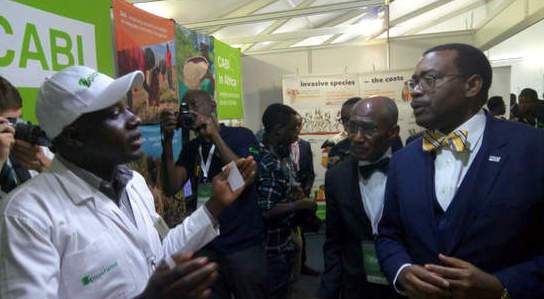 Damien Nsabiyumve explaining the role of “plant doctors” in the “Plantwise” programme
Damien Nsabiyumve explaining the role of “plant doctors” in the “Plantwise” programme
This blogpost by Diane Uwanyirigira originally appeared on the FARA blog.
 Damien Nsabiyumve explaining the role of “plant doctors” in the “Plantwise” programme
Damien Nsabiyumve explaining the role of “plant doctors” in the “Plantwise” programme
This blogpost by Diane Uwanyirigira originally appeared on the FARA blog.
The 7th Africa Agriculture Science Week (AASW7) organized by the Forum for Agriculture Research in Africa (FARA) is took place in Kigali-Rwanda from June 13-16. During this event many companies and organisations attended, and brought their products and services to market and share innovations from different regions.
Nsabiyumva Damien, a Rwandan national, was one of them. This man is a “plant doctor”, passionate about agriculture. Damien explained the role of plant doctors and what is their intension to participate in the FARA’s exhibition.
“I am working in the Kicukiro sector, in Rwanda, as as an agronomist and also volunteer at Rwanda Plantwise program as a plant doctor in the Masaka sector“, he introduced himself.
“Plantwise” is a programme led by a non-profit organization “Center for Agriculture and Biosciences International” (CABI). The mission of CABI is to improve people’s lives worldwide by providing information and applying scientifically expertise to solve problem in agriculture and environment.
“Plantwise” is working under CABI’s mission and helps famers to lose less of what they grow, by overcoming plant health problems.
This programme was officially launched in 2011 in Bolivia, Uganda, Rwanda and many other countries. It is working closely with national agricultural advisory services, to establish and support sustainable networks of plant clinics run by trained plant doctors where farmers can find practical plant health advice.
“Agriculture in Africa is a sector mostly concerning vulnerable and poor people in rural areas. Most of them are doing it for subsistence, and geared towards a market economy. They need to be approached and guided along their activities, mostly in pest and diseases diagnosis”, said Damien.
How do those “Plant Clinics” work?
Damien explained that plant doctors are local government leaders who volunteer in “Plantwise”. After being trained, they are appointed to manage their respective regions and are given a package of materials necessary to perform their work.
They have two days a week for this voluntary work at the “Plant Clinics”. Those clinics work like human clinics where farmers bring samples of their crops to plant doctors for diagnosis. After their consultation, they receive recommendations and records are kept for the next session references.
How far are the clinic services established at a local level?
“Today technology is the key to accelerate the work, make it quick and accurate. Now we are introducing a system called “E-clinic” where we use the electronic tablets for recording our data, and access to information. We have 180 plant doctors working in 66 different clinics across the country. The use of those tablets help us to share records and take measures for the next coming seasons”, explained Damien.
Damien says that participating in #AASW7 is important for “Plantwise”: they are interacting with different participants including researchers, investors and policy makers. It expands their reach, to make people aware of their service.
Connecting to farmers, government agencies and extension services, allows them to serve more farmers directly, with concrete advise. As, after all, farmers are pragmatic people: “They have a problem, and we give them a cure”, Damien says, “just like doctors for humans would do”.
Blogpost and picture by Diane Uwanyirigira, duwanyirigira(at)dotrust.org, #AASW7 social reporter.
This post represents the author’s views only.

